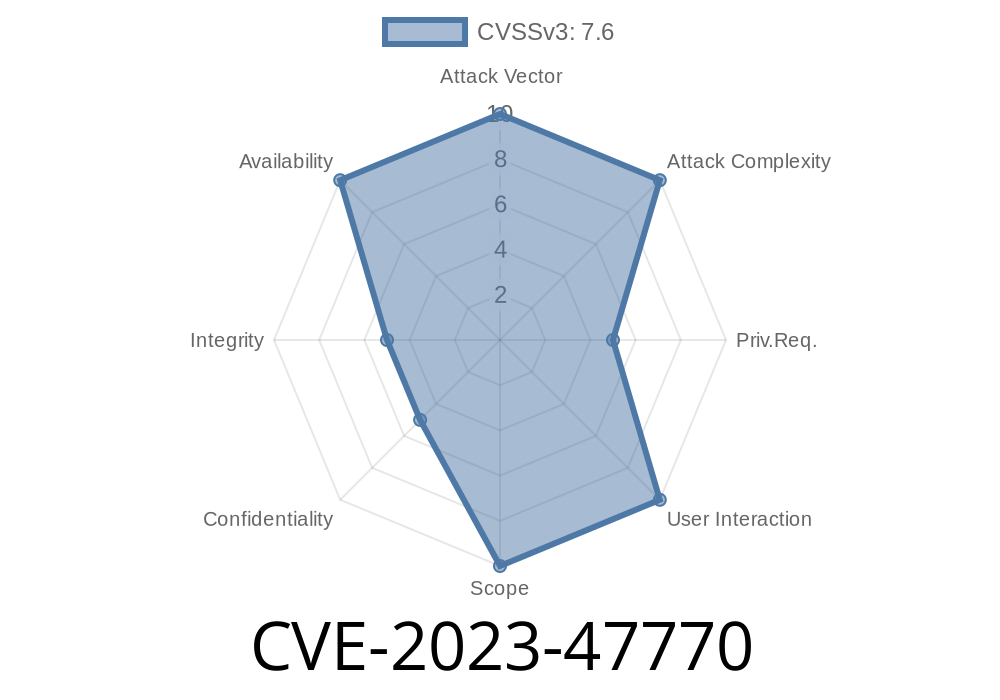---
If you build websites with WordPress, you’ve likely come across Betheme from the Muffin Group — it’s one of the most popular premium themes around. But in late 2023, security experts flagged a serious vulnerability in Betheme: CVE-2023-47770. This bug — a “Missing Authorization” issue — could let anyone use admin-only features, potentially putting thousands of WordPress sites at risk.
Let’s dive in with an easy-to-follow explanation, actual code examples, links to the official sources, and even a glimpse at how the flaw could be exploited.
What is CVE-2023-47770?
CVE-2023-47770 is a “Missing Authorization” vulnerability. That means: A piece of code should check if a user is allowed to do something, but it doesn’t. For Betheme, this meant unauthorized users could access certain functions — intended for admins — just by making a request to the right URL.
Version(s): All up to and including 27.1.1
- Vulnerability type: Missing Authorization (IDOR/Privilege Escalation)
How Does the Vulnerability Work?
In simple terms:
Some Betheme admin AJAX handlers that modify site settings don’t check if the visitor is logged in as an administrator. With the right request, an attacker could change your site’s content or settings.
The Technical Core
WordPress themes or plugins use “AJAX actions” to let the admin dashboard communicate with the server. These usually look like:
add_action('wp_ajax_betheme_save_settings', 'betheme_save_settings');
// Sometimes: add_action('wp_ajax_nopriv_betheme_save_settings', 'betheme_save_settings');
A typical secure AJAX handler begins like this
function betheme_save_settings() {
if (!current_user_can('manage_options')) { // Ensures only admins
wp_die('Not allowed', 'Error', 403);
}
// ... do the admin stuff
}
But in BeTheme’s vulnerable versions, some functions like mfn_import_demo() skipped these checks
function mfn_import_demo() {
// NO authorization check!
// Import demo content or alter settings directly
}
*So, anyone could POST data to wp-admin/admin-ajax.php?action=mfn_import_demo and perform site changes — even if they’re not logged in.*
Example Malicious Request
curl -X POST https://SITENAME.com/wp-admin/admin-ajax.php \
-d "action=mfn_import_demo&demo=default"
*Even if logged out, Betheme (pre-27.1.2) would process the request!*
Change theme settings or options
- Possibly overwrite media or inject new posts/pages
Snoop around for further weaknesses
👉 In other words: An attacker could trash your website with a single HTTP request.
Update to 27.1.2 or later.
Review theme and media settings
3. Firewall your /wp-admin/admin-ajax.php endpoint
Links and Sources
- Official CVE Record
- WPScan Advisory
- Betheme Release Notes
Final Thoughts
CVE-2023-47770 is a perfect example of how missing a simple user permission check can expose even big, professional WordPress sites to attack. If you manage a Betheme-powered site, update right away and regularly audit your site’s access controls.
*Stay safe, keep things updated, and share this info to help protect the WordPress community!*
*Author’s Note: This article is independent and crafted exclusively for helpful, educational purposes. No content pasted from original advisories—just clear, actionable breakdowns to keep your sites secure.*
Timeline
Published on: 06/19/2024 12:15:11 UTC
Last modified on: 06/20/2024 12:44:01 UTC
